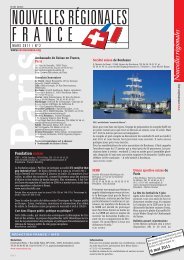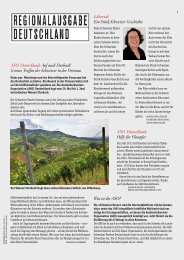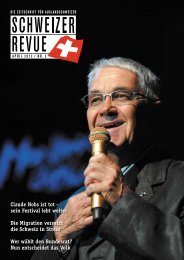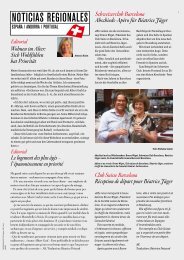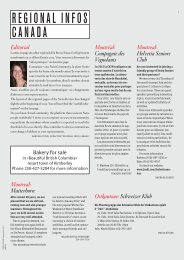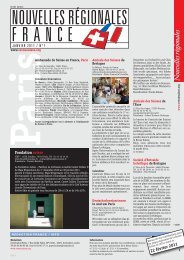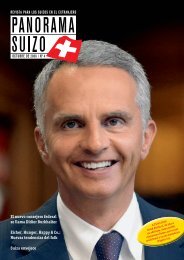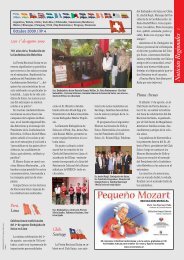Which energy will be best for Switzerland? Doris ... - Schweizer Revue
Which energy will be best for Switzerland? Doris ... - Schweizer Revue
Which energy will be best for Switzerland? Doris ... - Schweizer Revue
Create successful ePaper yourself
Turn your PDF publications into a flip-book with our unique Google optimized e-Paper software.
8<br />
THE FUTURE OF ENERGY SUPPLY<br />
<strong>Which</strong> <strong>energy</strong> is <strong>be</strong>st <strong>for</strong> <strong>Switzerland</strong>?<br />
The future of <strong>energy</strong> supply is currently a hotly-debated issue in our country. The Federal Council<br />
and environmental groups have a vision of a “2000 watt society”, while electricity utilities dream<br />
about a “renaissance of nuclear power”.<br />
SWISS REVIEW August 2006 / No. 4<br />
Energy Minister Moritz Leuen<strong>be</strong>rger created<br />
waves last year when he announced, “In<br />
the coming decades, the Federal Council <strong>will</strong><br />
work towards realising the vision of a 2000<br />
watt society. In this vision, per-capita consumption<br />
of <strong>energy</strong> would not exceed 2000<br />
watts – that is, <strong>be</strong>tween a half and a third of<br />
the current level in this country. Such visions<br />
are not illusory.” This target is to <strong>be</strong> met by<br />
making machines, motor vehicles and buildings<br />
more efficient and capitalising on the<br />
potentials offered by renewable <strong>energy</strong>.<br />
<strong>Switzerland</strong> is currently witnessing a repeat<br />
of the policy debate that raged back in<br />
the 1970s and 80s. Once again, the talk is<br />
about <strong>energy</strong> scenarios <strong>for</strong> the coming years,<br />
fears of electricity deficits, and the possible<br />
construction of new nuclear or natural gasdriven<br />
power plants. And yet again, utility<br />
operators and their corporate interests are<br />
pitted against the brash and well-researched<br />
promoters of modern alternative <strong>energy</strong><br />
sources.<br />
Energy prospects <strong>for</strong> <strong>Switzerland</strong><br />
This spring the Federal Office <strong>for</strong> Energy<br />
(SFOE) published its guidelines <strong>for</strong> a future<br />
<strong>energy</strong> policy <strong>for</strong> <strong>Switzerland</strong>. Its prognoses<br />
<strong>for</strong> the period 2035-2050 suggest that demand<br />
<strong>for</strong> electricity could increase by as<br />
much as 24 percent, and warns of ”persistent<br />
electricity shortfalls” by about 2020 <strong>be</strong>cause<br />
the three smaller nuclear power stations in<br />
Beznau and Mühle<strong>be</strong>rg <strong>will</strong> <strong>be</strong> taken off the<br />
grid and electricity supply contracts with<br />
France <strong>will</strong> <strong>be</strong>gin to expire.<br />
The SFOE has there<strong>for</strong>e announced a<br />
three-pronged strategy to secure power supplies:<br />
Firstly, broad technical improvements<br />
in <strong>energy</strong> efficiency; secondly, developing extra<br />
capacities <strong>for</strong> renewable energies such as<br />
geothermal power (heat from deep underground),<br />
photovoltaic <strong>energy</strong> (trans<strong>for</strong>ming<br />
light into direct current using photoelectric<br />
cells), biomass or wood as well as the expansion<br />
of hydroelectric power (technical upgrades,<br />
small-scale power plants); and thirdly<br />
constructing fossil thermal plants with optimised<br />
re-use of waste heat (combined gas<br />
power plants). Interestingly enough, the<br />
SFOE is not planning to build new nuclear<br />
power plants <strong>for</strong> the time <strong>be</strong>ing <strong>be</strong>cause of<br />
the lengthy approval process and lack of a solution<br />
<strong>for</strong> disposing of nuclear waste.<br />
Call <strong>for</strong> “major action”<br />
Environmental organisations are urging gutsier,<br />
more specific measures than the Swiss<br />
authorities. Yet they are pursuing the same<br />
aim of an environmentally friendly “2000<br />
watt society” as the Federal Council. ”We<br />
must reduce our <strong>energy</strong> consumption by twothirds<br />
by 2050,” they say. They are also calling<br />
<strong>for</strong> “major action”, specifically employing<br />
the <strong>be</strong>st technology <strong>for</strong> all investment<br />
and consumer decision-making; control taxes<br />
on all <strong>energy</strong> sources; stricter technical<br />
norms <strong>for</strong> electrical devices; the Minergie<br />
standard <strong>for</strong> insulation, windows and heat recovery<br />
in new and renovated houses; and<br />
cost-covering prices <strong>for</strong> electricity supplied<br />
from alternative sources.<br />
Environmentalists say the following are essential<br />
in order to meet the ambitious target<br />
of creating a “2000 watt society”: <strong>be</strong>tter<br />
technology (from heating systems to electric<br />
motors), <strong>be</strong>tter houses (insulation), <strong>be</strong>tter<br />
transport (cars that consume less than 3.5 litres<br />
of fuel per 100 kilometers, hybrid buses),<br />
less driving (<strong>for</strong> business and pleasure) and<br />
more renewable <strong>energy</strong>.<br />
A nuclear power renaissance?<br />
The electricity industry has very different<br />
objectives. The “Preview of electricity supply<br />
in <strong>Switzerland</strong> in the period 2035-2050”<br />
by the industry’s umbrella organisation<br />
points to a deficit in electricity supply from<br />
2020 onwards. It says cuts in electricity consumption<br />
are “unrealistic in the long term.”<br />
And it suggests that the proportion of domestic<br />
electricity production covered by renewable<br />
(wind, photovoltaic, biomass and<br />
geothermal) <strong>energy</strong> “would not exceed 10<br />
percent <strong>for</strong> a long time.” Three variations are<br />
proposed <strong>for</strong> bridging the gap <strong>be</strong>tween electricity<br />
supply and demand: new nuclear<br />
power plants, natural gas combined-cycle<br />
plants, and a combination of natural gas and<br />
atomic power.<br />
“Nuclear power must play a major role in<br />
Swiss electricity supply in the long term,” the<br />
nuclear lobby says. This has reignited the debate<br />
over nuclear power in <strong>Switzerland</strong>.<br />
Power companies are even talking about a<br />
“renaissance <strong>for</strong> nuclear power” and enthusing<br />
about the new European 1600-megawatt<br />
EPR pressurised water reactor.<br />
Energy expert Rudolf Rechsteiner says the<br />
high cost of investing in nuclear power makes<br />
it “uncompetitive in a free market”. Given<br />
the political risks involved, it remains to <strong>be</strong><br />
seen whether private investors like banks <strong>will</strong><br />
invest in nuclear technology. Martin Bäumle,<br />
a scientist and Green National Councillor,<br />
says, “No-one can guarantee geological and<br />
social stability <strong>for</strong> the 10,000 years it takes<br />
to isolate highly radioactive waste.”<br />
Polls carried out this spring show that the<br />
Swiss remain split over the issue of nuclear<br />
power. Asked “Should the nuclear power<br />
plants in use today <strong>be</strong> replaced by a new generation<br />
of nuclear power plants?”, 46 percent<br />
of respondents answered Yes, and 51 percent<br />
No. The future of atomic <strong>energy</strong> in <strong>Switzerland</strong><br />
<strong>will</strong> eventually <strong>be</strong> decided by voters at<br />
home and abroad. The proposed Nuclear<br />
Power Act <strong>will</strong> <strong>be</strong> put to an obligatory referendum<br />
in a move to seek grass-roots approval<br />
<strong>for</strong> new nuclear power plants. ROLF RIBI<br />
DOCUMENTATION:<br />
www.energiestiftung.ch (Swiss Energy Foundation,<br />
Greenpeace <strong>Switzerland</strong>, Transport and Environment<br />
Association, WWF <strong>Switzerland</strong>) – www.strom.ch<br />
(Swiss Electricity Producers’ and Distributors’ Association)<br />
– www.iea.org (International Energy Agency,<br />
World Energy Outlook)



